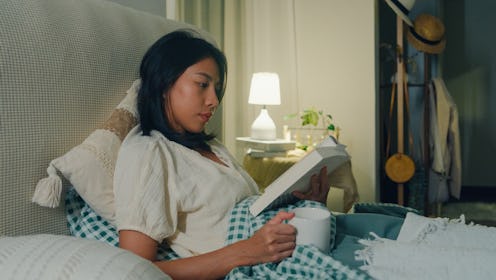Books
These Classics Are Actually Super Sexist

You probably know by now that literary sexism can be sneaky. After all, there's a difference between a book that portrays sexism and a book with a sexist message. I mean, the fictional nation of Gilead is super sexist, for example, what with the women wearing wacky bonnets. But I don't think anyone's reading Margaret Atwood's The Handmaid's Tale and walking away thinking that women are inferior or that Gilead sounds super rad (if that was your impression, maybe try the book again). Then there's the books that are just blatantly sexist — like The Sun Also Rises by Ernest Hemingway. And sometimes books that seem harmless, or even actively feminist can still play into ugly gender stereotypes. But here are a few books that you never realized were sexist.
To be clear, just because a book is sexist, it doesn't mean that it has zero value. If we chucked every aspect of our culture that wasn't perfectly feminist, we'd be left with those period-friendly underwear, some great essays by Roxane Gay, and not much else. So if you love the books on this list, feel free to keep on loving them. Just maybe, while you continue to love them, try to acknowledge that Ernest Hemingway was a huge tool who hated women.
We can both appreciate a good piece of literature and critique its sexist undertones at the same time. And... oh boy is there a lot to critique with some of these books:
1'Little Women' by Louisa May Alcott
OK, so this critique kind of applies more to Louisa May Alcott's work in general than to Little Women specifically (don't read Eight Cousins if you value your sanity). But even in Little Women, feminist icon Jo March openly disdains her own gender. She doesn't conform to traditional gender roles, but she also judges those who do. In the sequels Little Men and Jo's Boys, she makes it abundantly clear that she thinks boys are more fun, and would rather only parent male children. Ugh Jo, why?
2'On the Road' by Jack Kerouac
I love Kerouac just as much as the next person, but he's not exactly a feminist. For all of his beat generation, sex positive attitude, he still looks at women as amusing diversions on his adventures, rather than real people. Wives are discarded, girlfriends are objectified, and serious conversations are only had with other men.
3'The Scarlet Letter' by Nathaniel Hawthorne
Poor Hawthorne. His book is already legendary for boring millions of high schoolers to tears, and now I'm going to challenge his proto-feminist status, too. The Scarlet Letter does argue that women shouldn't be shamed and punished for their sexuality, which is admirable... but we're clearly supposed to look at Hester Prynne as a pillar of virtue for refusing to out Dimmesdale as her ex-lover. Hester's silent suffering is what makes her a hero. It's incredibly condescending. Day one I would have turned Dimmesdale in, and then peaced out of Puritan America as fast as humanly possible.
4'The Adventures of Huckleberry Finn' by Mark Twain
We spend so much time debating the complicated representations of race in Huckleberry Finn, we never even stop to think whether or not it's super sexist. And... it is. Every female character is a nag or a shrew or a bimbo. Mark Twain is not exactly famous for writing a lot of nuance women.
5'Jane Eyre' by Charlotte Brontë
Jane Eyre is another classic literary proto-feminist character, but boy is there a lot of sexist nonsense going on around her. Mr. Rochester might be the mean, grumpy man of her dreams, but he locks his wife in the attic rather than deal with her mental illness sensitively. And doesn't tell his girlfriend about it. And we're supposed to accept him as our romantic hero. He's less openly sexist than Jane's creepy cousin St. John... but that's a pretty low bar to clear.
6'Peter Pan' by J.M. Barrie
Where to even begin with this one? All of the Lost Boys are, well, boys (actually, it kind of rings true that boys get to act like boys forever, and little girls have to mother them). Wendy is forced into a maternal role right away, Tinkerbell is your classic jealous woman, and Tiger Lily gets to be both the typical damsel in distress and a horrifically racist stereotype of the Native American princess.
7'The Awakening' by Kate Chopin
Yes, I am going after one of the classic early feminist novels, but just hear me out! The Awakening deals pretty directly with sexism: our heroine, Edna, feels stifled and oppressed by her do-nothing housewife life. She moves out on her boring husband, starts an affair, and eventually walks into the ocean because sexism is inescapable. Kate Chopin very cleared wants women to feel free and emotionally fulfilled. But... Kate Chopin is also very clearly only thinking of rich, white women. The struggles of sexism as portrayed in The Awakening are entirely bound up with the problems of the upper class. Edna's ruminating on the purpose of womankind ends up erasing any woman who does not look like her.